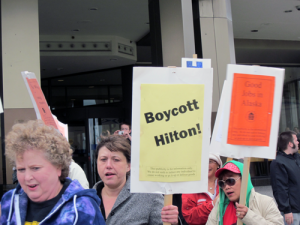
The ACLU of Alaska is challenging the Municipality of Anchorage law on sidewalk-sitting and panhandling. They say the law is unconstitutional.
Jeffrey Mittman is the Executive Director of the American Civil Liberties Union of Alaska. He says the ordinance adopted by the Anchorage Assembly created two distinct unconstitutional sections in Anchorage Municipal code that are in conflict with the Alaska Constitution.
“As Alaskans, we depend upon our incredibly strong constitution, which is very clear, this ordinance is not permissible,” Mittman said.
The law bans most sitting or lying down and panhandling on downtown sidewalks. It was adopted by the Assembly in November 2011. ACLU attorneys argue the ordinance violates freedom of expression and infringes on the right to peaceably assemble. The ACLU wrote letters to the Assembly expressing concern about the change in law. The Assembly repealed the ordinance in September 2012. Mayor Dan Sullivan quickly vetoed the repeal. Joshua Decker is the ACLU attorney handling the case. He says the ACLU has reached out to municipal officials hoping to amend the code.
“We’re very happy to work with the municipality to craft laws that address problems of sitting on the sidewalk, problems of obstructing traffic, but they should be well-tailored to Alaska, well tailored to Anchorage, but those laws sadly are not,” Decker said.
Decker says the Mayor’s office has not been responsive. The ACLU is concerned that the law could be used to prevent workers from protesting and artists from performing. The eight plaintiffs signed onto the lawsuit range in age from 26 to 95-years-old and from liberal to libertarian. They include activists in the Occupy movement and artist. Two labor unions also signed onto the lawsuit. Vince Beltrami is president of the Alaska AFL-CIO. He says he’s concerned that workers protesting unfair labor practices could be arrested.
“Oftentimes workers may have issues that put us on the street protesting you know poor treatment or whatnot,” Beltrami said. “Maybe unfair labor practices that have been committed by an employer or city government officials for that matter.”
“This would preclude us from being able to protest. Our basic first amendment rights to free speech are being stifled if we don’t stand up for this.”
Beltrami says that he doesn’t know of any workers who have been fined or arrested while protesting since the ordinances were put in place. Teeka Ballas is an artist who runs the city’s arts magazine. She is concerned the law could prevent her from performing in downtown Anchorage.
“I just really hope that there’s a rewording that comes with this so that people can still sit and eat their lunch and not have the threat of maybe being harassed by police officers or fined by police officers and that, as a performance artist, I can continue to do art in a visible area,” Ballas said. “If you want to bus if you want to do a flash mob, if you want to protest, the only reasonable place to do that is downtown Anchorage, and right now, currently, we don’t have that right.”
Anchorage Police Department Officials say that they have not yet cited anyone using the law since it went on the books. But they have enforced it by asking people to leave the sidewalk.
Mayor Sullivan proposed ‘the side-walk sitting law’ after a homeless man, John Martin, was camped out in front of City Hall in 2011 protesting the Mayor’s policy of clearing out homeless camps in Anchorage.
Dennis Wheeler, an attorney for the Municipality of Anchorage said he was surprised by the lawsuit.
We spent a significant amount of time and effort to craft an ordinance that we felt met the constitutional requirements and that’s why we spent so much time working to model it as close as we could after the Seattle version gone through the federal 9th circuit court of appeals and had withstood a constitutional challenge, by among others the ACLU, so we feel very comfortable that we’ve crafted something that works,” Wheeler said.
Wheeler adds it has never been the intention of the municipality to interfere with people’s ability to freely assemble.
Listen to the full story
Daysha Eaton is a contributor with the Alaska Public Radio Network.
Daysha Eaton holds a B.A. from Evergreen State College, and a M.A. from the University of Southern California. Daysha got her start in radio at Seattle public radio stations, KPLU and KUOW. Before coming to KBBI, she was the News Director at KYUK in Bethel. She has also worked as the Southcentral Reporter for KSKA in Anchorage.
Daysha's work has appeared on NPR's "Morning Edition" and "All Things Considered", PRI's "The World" and "National Native News". She's happy to take assignments, and to get news tips, which are best sent via email.
Daysha became a journalist because she believes in the power of storytelling. Stories connect us and they help us make sense of our world. They shed light on injustice and they comfort us in troubled times. She got into public broadcasting because it seems to fulfill the intention of the 4th Estate and to most effectively apply the freedom of the press granted to us through the Constitution. She feels that public radio has a special way of moving people emotionally through sound, taking them to remote places, introducing them to people they would not otherwise meet and compelling them to think about issues they might ordinarily overlook.




